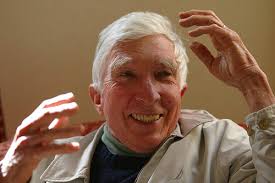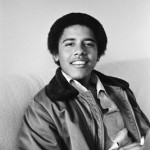(3-minute read)
Today, we look back at the insights and perspective of one thoughtful White American on his society’s racial culture, and his worried-grandad prospectus for two young Blacks that he loves like family, because they are.
In Updike’s Self-Consciousness: Memoirs (I reviewed it here), he knits together six themed reflections on the life that he lived. In nearly all of them, the world being what it is and the United States playing the role within it that it does, he refers to the question of race, even if only obliquely. One of his essays, though, addresses it straight on: “A Letter to My Grandsons”, second-last of the six, speaks directly circa 1989 to the two young boys born from the union of Updike’s eldest daughter and her West African-born husband, who “are about as black and white as people can be”. The boys’ names are Anoff and Kwame, and who knows who and where and what they are today? I wonder what they make, as grown men, of the 48-page public rumination that their deceased and famous literary grandfather bequeathed to them, to say nothing of the country left behind by his and subsequent generations.
For my taste, too much of the letter was preoccupied with obscure and distant Updike-side genealogy. It made for dull reading. However, other parts were electric, for me, and these are the places where the writer frankly assesses the American racial culture and bares his fears and hopes for his beloved young grandsons’ place within it. Updike was an honest, perceptive and profoundly eloquent writer, in 1989 and before, and until his death in a subsequent century. Here is a small chunk of what he left behind for his dark wee darlings to read when they came of a suitable age; as he concludes, I cannot help thinking of a young mixed-race man, not yet 20 when Updike
was writing to his grandkids, who went on to become both the first Black American to be President and (can anyone reasonably doubt it?) the lightning rod for a simmering racial discomfort and antagonism that seems to only be rising in 2016:
“Dear Anoff and Kwame:
“We are all of mixed blood….Genealogists tell us that we are all cousins, with common ancestors surprisingly few generations in the past; but when the strains that meet in you last met, it must have been early in the history of the human race…
“…And you, my grandsons, how will you fare here [in America]? When Anoff was born…, my instinctive thought was that he would do better if his parents settled in Ghana; that is, I trusted an African country to treat a half-white person better than my own country would treat a half-black. Now, I wonder. Ours is a changing, merging, exogamous world, and while racial prejudice operates in the United States against blacks in many ways overt and oblique,…at least our laws now formally insist upon equal rights….[P]rofessional sports and television commercials constantly offer images of multiracial camaraderie. An ideal colorblind society flickers at the forward edge of the sluggishly evolving one….America is slowly becoming yours, I want to think, as much as it is anyone’s….
“While integration has overtaken the media image of ourselves, the reality lags behind. Until I went to college I had hardly met a black person. In my profession, though I have had polite exchanges with a number of black authors, I have never dealt with a black as an editor, printer or publishing executive. Across the politest of exchanges between blacks and whites a shadow falls, an apprehensiveness and wary memory like the dapple under a trellised grapevine….As blacks, you will shoulder here a load of history and mythology that may hide you from yourselves and cut into your freedom to pursue happiness. You will each be in subtle (at best) ways the focus of distaste and hatred and fear that have nothing to do with anything but your skins…
“Still, we must all take our chances, and the world is not anywhere a basically friendly place, though our mothers and fathers and schoolteachers would make it seem so. If you boys do live your lives here, you will become something that neither of your parents are: black Americans. None of your kin can perfectly advise you in taking up this identity. Though exactly half white, you will be considered black….Even as I write you this letter that you are not ready to read, I foresee how estranging my own whiteness may eventually become….America is still to some degree waiting to be made, and will be for each of us what we make it. May you both, if this old wilderness is to be your nation, find it [as one of John Updike’s German-Dutch ancestors reported] ‘as good a country as any man need to dwell in…’”
John Updike (1932-2009) was one of the most prolific and decorated writers of the 20th century, but after a brilliant academic career at Harvard he had intended to become a cartoonist. He wrote 27 novels, nine essay collections, eight volumes of poetry, hundreds of short stories and some of the most-read literary reviews in America. He won the Pulitzer Prize for fiction twice, and a great host of other honours both for individual books and for his entire body of work.


